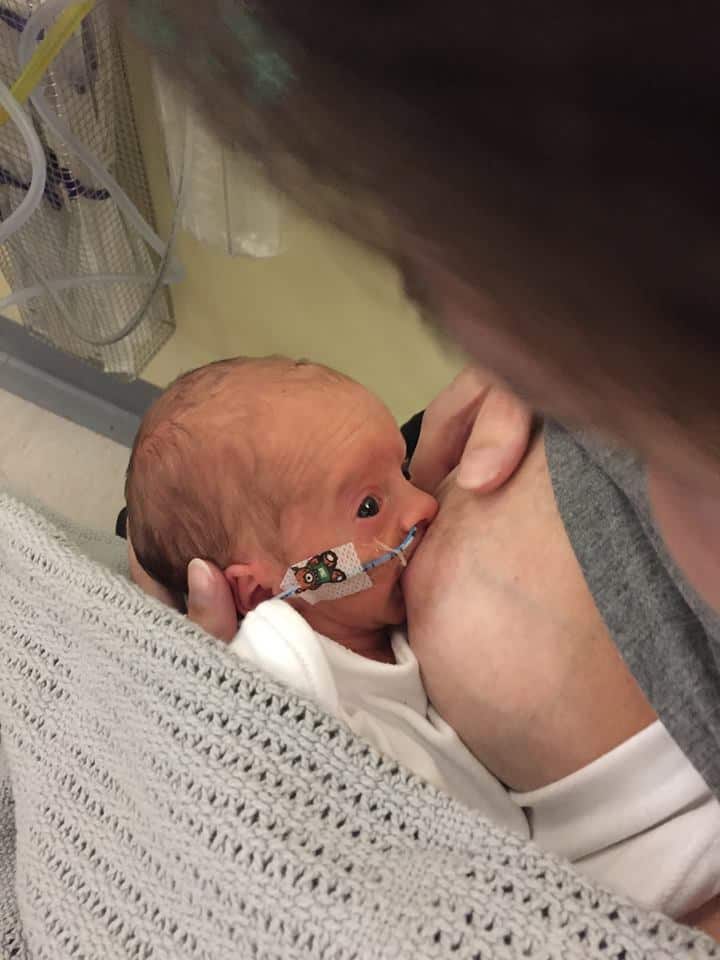How To Breastfeed A Premature Baby?
You may be wondering how to breastfeed a premature baby. There are challenges associated with breastfeeding a newborn that had a preterm birth because a full term baby has attained more developmental milestones than a premature baby. Thus, there may be reflexes such a sucking reflex needed for breastfeeding which may not quite be in perfect working order. Nevertheless, it is still possible for you to successfully breastfeed a premature baby.
Click here for information on your preemie's development. Click here for developmental details of a full-term baby.
How early can the baby latch on?
The older your premature baby is when he or she is born, the greater the chances for successful feeding at the breast. At 28 weeks, your baby could be able to latch on to the breast. His or her sucking reflexes may not be great or strong but it will gradually improve with time. Hence, milk maybe consumed from your breasts by your baby intermittently or on a gradual schedule. As time passes, your baby will be able to become much stronger and latch in a more appropriate manner. Your baby’s ability to latch on to your breasts and actually cause milk to be expressed will also depend on his or her other associated issues.
For example, if respiratory issues were a significant factor for your premature baby, then being able to breastfeed may not be accomplished until more development occurs or until your baby’s respiratory track has been cleared of any infections or impairments.
How to breastfeed:

It may be challenging to carry out breastfeeding for a premature baby, but this can be achieved with the proper teaching technique and persistence. You will have to be careful of your baby’s small frame and position his or her head and body just right to ensure that it is a comfortable experience for your baby. When your baby realizes that nourishment is coming from the breasts, there will be a greater incentive to keep trying to extract milk.
In some places bottles may be used to first develop and encourage a sucking reflex in premature babies. Some people may also use special nipple guards to aid the ability of your baby to latch on. While breastfeeding a premature baby, comfort levels can slowly be reached.
There are also tales of premature babies falling asleep at the breast. This typically happens to every baby, whether you are breastfeeding a premature baby or otherwise. If a baby is tired or sleepy, there is the increased likelihood that he or she will gradually drift to sleep while trying to suck at your breast. The sucking motion on the breast can also serve the same purpose a pacifier serves. There are also parents who may decide to place their premature babies on the breast and encourage the baby to feed because this can help gently send them to sleep. You can determine if this technique works for you and your baby too.
Stay focused and motivated:
It is important to note that it may take some time for you to properly get the hang of how to breastfeed your premature baby properly. If you baby is born prematurely and you have a desire to breastfeed your baby, you can consult a lactating specialist who will help provide some guidance regarding what you can do to provide a successful feeding transition for your baby. For motivation, refer to our article on the benefits of breastfeeding.
Short on supply?
You may be advised to build or keep your milk supply up. This can be challenging if your baby is still developing and trying to recover from any infection or trauma. Refer to our article on the 8 effective ways you can increase the quality and flow of your breast milk.
Having problems in latching?
If you are getting frustrated because you are unable to make your baby latch on to you, stop right there. You can feed your preemie breastmilk using a bottle! As simple as that!
You may want to purchase a breast pump that you can use to express milk
and this milk can be given to your baby through bottle feeding. The
good news about this approach is that you are still providing breast
milk for your baby, which has many benefits for a newborn. For details on different kinds of breastpump (manual and electric) and how to express and store (room temperature, fridge or freezer) your breast milk, refer to our article on Expressing and Storing Breast Milk.

The bottom line is...
How to breastfeed a newborn may not be the easiest task for most of the
mothers. Your premature baby requires more attention and care to develop,
so how to breastfeed your preemie may seem as a difficult task for you.
Don't give up. You are making the best choice for offering your newborn
breast milk. Hang on there! You will be a pro soon. You always have a backup preemie formula milk option in case you need it.
Return to Premature Babies or Breastfeeding section.
Return from How To Breastfeed A Premature Baby to Homepage.



New! Comments
Have something to say about what you just read? Leave me a comment in the box below :)